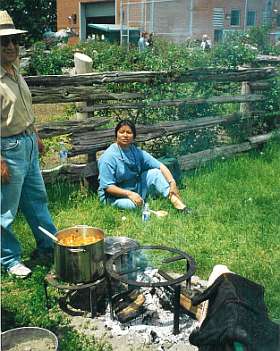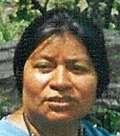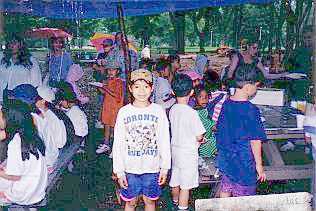


Campfire stories from "Cooking with Fire"
In this section:
Isabel:

Isabel Perez, cooking-fire lady
Our park's "cooking-fire lady," Isabel Perez, grew up cooking over a fire in Guatemala, and she used to miss that kind of cooking, living in Toronto. She once told us that when the first people in her neighbourhood back home got gas stoves, most of their families refused to eat the food cooked on them, saying the gas made the food taste bad. Everyone wanted to keep on eating food cooked over fire.When we asked Isabel whether she would try cooking over a fire at the park, she said she'd love to. But she wasn't used to it anymore, and some familiar arrangements were missing. Back home in Guatemala her father had built a clay fireplace in their courtyard, with support for a grill. But in our park we had no fireplace. Isabel wanted to cook tortillas with the kids at the park, and for that she needed a level grill. In the park we first tried to balance the grill on some rocks stacked around the campfire, but the rocks were unsteady, and then we tried a semi-circle of firebricks but the bricks were very heavy to set up each time. One day we happened to come across a window display of cast-iron four-legged pot stands, built for cooking-fires, at a hardware store in an Italian part of town. We bought a big stand, one foot high and two feet in diameter, for $39.95. A week later we went back and bought a smaller stand, 8 inches by 16 inches, as well. That was the end of our troubles. Pots sat on the cast iron stands as steady as can be, or if we wanted, we laid a grill across the stand. Isabel made donuts with the camp kids in the summer, and tortillas, and dobladas, and pasta with sauce, in a big iron pot. A farmer named Krow came and did a corn roast. She brought a sack of corn picked a few hours before, and two chickens in a cage for the kids to see. They fed them corn until we thought the chickens might explode. (They didn't.)
 In the spring and the fall we invited school classes, and they made hot chocolate and roasted marshmallows, and one winter we cooked french fries every Sunday over a fire beside the skating rink.
In the spring and the fall we invited school classes, and they made hot chocolate and roasted marshmallows, and one winter we cooked french fries every Sunday over a fire beside the skating rink.
Sometimes when Isabel was cooking at the fire in the summertime, the smoke would curl slowly upwards through the trees and people going by would just stop in their tracks and stare. Cooking over a fire is a time warp. The cook moves more slowly and the food smells different. The sight of such a thing is surprising and disorienting for people walking through the park, and after they have stopped to take a look, they often walk away shaking their heads and smiling in a way that always pleases me very much.
A school visit:

A rainy visit
The second year after we got the campfire permit we began to let the nearby schools know they could book a park day with us and we would set them up with a fire and some food. One time soon after we started this, Margie Rutledge, who was in charge of the playground then, had booked two classes at the same time, on a Monday. It threatened rain all morning until just before the kids arrived, and then, as they made their way from the bus stop across the park, it began to pour. We thought we should send them home. But when the classes - a little United Nations - got to the campfire area, the kids were excited, squealing and hugging each other as they took shelter under the half-in-leaf maples. We said to the teachers - you should probably just go back to the school. But they said, no, it's really warm today and there's no wind, and we'll have a good time anyway. Can we maybe put up your tarp? So we unfolded the giant blue tarp and ten or more kids helped stretch it out and tie it to the tree branches. They pulled the picnic tables underneath and set themselves up in their "kitchen," with the cooking fire steaming and sputtering nearby. The teachers lined up the kids with paper plates and one of them held a big black umbrella over Isabel while she dished up warm macaroni and sauce from the pot.
There was a grand banquet under the tarp, with the kids shouting loud, outrageous stories back and forth while they ate. The rain fell in sheets. Every few minutes one of the kids would poke a big branch upwards to raise the centre of the sagging tarp and a great fall of water would slide off the edge, with excited screams from everywhere.
After half an hour the rain slowed down to a light drizzle. A few groups began to break off into their own little umbrella-houses, six or seven umbrellas with a tipi-cloth stretched overtop. Soon the big central banquet was split up into a village of smaller "huts," with some of the braver kids leaving shelter altogether, to try out the stilts or dig a river-channel in the sand pit.
By the time the rain stopped, fort-building was in progress in the sand pit, with a bridge over the river channel and a stone-reinforced embankment for a castle that only girls were allowed to go into. The staff and the teachers built the fire back up, so that it would be warm for the kids who were wet. The fire was the centre of this scene, with kids going out to build and to play and then coming back again to get warm.
By the end of the afternoon, when the two classes left, Margie and I thought we should present medals to those teachers, real gold medals with shovels and fire and stilts engraved on them, for being so kind and adventuresome with their students. What a day that was.
The rink campfire:
When we first started to try making the rink a bit more civilized, I used to come down on Sundays and make a campfire, beside the rink. Sometimes Fabio and Jennifer, aged 11 and 13, and I made chicken soup, cutting up the chicken and the vegetables at a picnic table beside the fire. We'd sell styrofoam cups of soup right from the fire, and we'd have a pot of hot chocolate simmering there too. Skaters would come over and sit on the benches and warm their hands on their soup cup or their hot chocolate cup. Even when I had two fire helpers, there were a few times when I felt a little overwhelmed. People would come over to the fire and they would want to talk, which was the original point of doing this fire - neighbourliness. The problem was, they didn't only want to talk to each other, they also wanted to talk to me, and I was trying to concentrate on keeping the food clean and the fire burning. Sometimes I used to get a little short with people, and afterwards I felt sorry.
One Sunday a man came over with his three children and sat by the campfire, and I noticed his right hand had no fingers. The stump looked swollen, dark red. He saw me looking. He said, "next week it will be one year since I lost my fingers." He said he worked in a tool and die factory and he'd been trying to fix his stamping machine. It was stuck. Suddenly it came unstuck and came down on his hand. As he told me this I could see he was back there again and the machine was coming down again. He told me that he now has terrible phantom pain. They had told him at the clinic that the pain would get better after six months. But it had got even worse.
His wife came over. She wore a sari under her winter jacket. I had never met her (or anyone in this family) before, but she, like her husband, seemed to have no desire to hide their situation. She watched him as he poked at the campfire with his other hand, and said, "he suffers all the time." And, indeed, he sat there suffering, getting his children some soup, talking to them, and suffering in the intervals, his shoulders hunched. The campfire was his rightful forum, where he could find witnesses for his suffering, and for his bravery. This is another ancient reason for campfires.
The basketball campfire:
Sam, the basketball player, approached me to ask if he and the other regulars from the basketball court could have a campfire one evening. I got him two pails of water and a shovel and showed him the wood supply, and gave him a talk about his responsibilities. He said, "no problem."
Later that evening I went over to the fire circle and saw they had set up a grill and were making hot dogs. There was some beer but it didn't look bad, and the lot of them, about a dozen, looked so pleased, both with the fire and with themselves, that I left quickly, not wanting to intrude in their club. The next morning we saw that the fire site was tidy and the pails and shovels had been neatly propped next to the rink house door.
In the week after that, Sam came almost every day, saying they were going to barbecue some chicken that evening, or maybe try baking pizza dough on a stick. The scene by the campfire was a little louder as the week went on, but very friendly, with maybe fifteen people most evenings. By eleven at night there would be only a small group left, staring into the glowing coals. One night I could hear the group singing, and drumming with sticks on the park bench. When they saw me coming toward them, they free-styled some complimentary verses about fire and parks and ovens. Very graceful. Then on the weekend they had a fire in the afternoon, but when I went to check later, all the youth had left. Two older homeless men who store their stuff in the park compost bin had taken their places, and they were grilling sausages with three other homeless-looking guys I had never seen before. I saw some bottles in brown paper bags, but nothing seemed out of hand, and this group, too, looked very pleased with themselves. They seemed to me like gypsies, free under the sky, lacking nothing. They urged me to have a sausage, but I was too squeamish and said I had to go back home.
In the days that followed, Sam said he was getting tired of being in charge of the campfire every evening, and he brought his friend Gerry over as his alternate, but then Gerry said he didn't want to stay all the time either. I said, I only trust a few of you to be in charge, I don't even know some of these guys. So Gerry said he'd stay, because the others were all pressuring him.
Late one evening, though, I found neither Sam nor Gerry there. There was a fire, though, and the half dozen youth sitting around it must have run out of wood part way through the evening. They were burning a piece of one of the park's homemade checker tables. I made them put the fire out and gave them a sharp lecture. They looked at me but didn't say anything.
Next morning, a bleary-eyed Sam was waiting for Lily at the door of the rink house when she arrived for work. Sam asked her for wood to cook breakfast. They intended to make steak and eggs. It turned out that when Sam returned the previous evening they had resurrected the fire and stayed in the park all night, drinking beer and burning up most of a park bench to keep warm.
That put them all in the dog house, and we didn't let them have any more campfires.
But they did have a really good time at the beginning.
The beating:
A group of five families were having a campfire on the Sunday of Labour Day Weekend. At about 9.30 a fight broke out near the basketball court, and it turned into a group attack by 6-10 guys who kicked one person repeatedly about the head and chest. When the families at the fire circle realized what was happening, they yelled at these guys to stop. Some left the park then, but three of the attackers continued with the kicking. Because there were so many people in the campfire group, some of them got up the nerve to run over. That finally made everyone else leave. But the fellow who was being kicked wasn't moving - he was unconscious. They called 911 and gave him first aid. Then the ambulance came, and he was just coming around when they took him away.
The families put out the campfire and left too. They told us the next day that seeing this terrible beating was revolting, and also they were really worried about the effect on their kids. But I said they shouldn't underestimate the positive effect on their children. How many children get to see for themselves that their parents are brave and help out people in danger, instead of turning away? They said they guessed that was true.
Thank God all those families were in the park with the campfire. Who knows how that fellow would have ended up otherwise.
Hallowe'en:
Children from the Hawthorne-on-Essex Daycare Centre, and their parents, held a Hallowe'en Fundraiser. I went over to check on them after dark. They had made a big campfire in the fire circle, and there were sheet ghosts flapping in the trees. The park is usually pretty empty at this point in the year, but not that night. There were children everywhere, playing games in the dark and rolling down the hills and jumping out at each other from behind the trees. A lot of the parents had dressed up. I asked the kids what they were eating, and they told me: haunted hot dogs and terrible treats (popcorn stuffed into see-through latex gloves with jellybean fingernails), and drinking eerie drinks (mulled cider). There was a storyteller off to one side of the fire, telling a ghost story to a group of big-eyed kids, all of them very quiet. Charlotte, who organized this campfire, told me that the kids had such a wonderful time that everyone wants to make this event a yearly happening. And she said they raised $380 for new toys for their daycare.
Chestnuts:
A woman named Anna told me this: "At our campfire in the park last Saturday, it was already pretty cold out. When I came into the rink house with my little boy a few days later, the staff asked me if we all froze. But we didn't. We made a big fire and kept warm.
"We roasted my parents' homemade Italian sausages and a kind of hard homemade cheese that doesn't really have a name. We also roasted chestnuts, by making a slit in each nut and shaking them over the fire in an old frying pan. It worked okay, although my parents said it would have been better if we'd had a pan with holes in it, like people use back home for roasting chestnuts.
"Some kids we didn't know came over from the playground and we gave them some nuts. There was so much food, it was no problem sharing it.
"My parents had told me beforehand that a campfire at this time of year was silly. But at the park (there were twelve of us there), my parents started telling us about when they were young and still lived in Sicily. They used to go out to other farms to pick olives and if the weather turned bad, they'd make a fire and roast some food, and then go home without picking any olives, but with a full stomach. Now here they were again so many years later, cooking food over a campfire on a cold day in Canada, with their children and grandchildren. We had a really good time."
These excerpts are from Cooking with Fire in Public Space, by Jutta Mason, illustrated by Jane LowBeer, available at the rinkhouse. Text only available on this web site in PDF format: Cooking with Fire